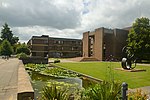Churchill Archives Centre

The Churchill Archives Centre (CAC) at Churchill College at the University of Cambridge is one of the largest repositories in the United Kingdom for the preservation and study of modern personal papers. It is best known for housing the papers of former British prime minister Winston Churchill. In addition to housing the personal papers of Churchill, the centre also houses the private papers of other notable figures, including former British prime minister Baroness Thatcher, Ernest Bevin, Enoch Powell, Lord Kinnock, Sir John Colville, Lord Hankey, Admiral Lord Fisher, Field Marshal Lord Slim, Sir John Cockcroft, Sir James Chadwick, Professor Lise Meitner, Dr Rosalind Franklin, and Sir Frank Whittle. The centre is the national and Commonwealth memorial to Winston Churchill and has been awarded designated status by the Museums, Libraries and Archives Council. The centre is open to the public. Its mission is to preserve the collections in its care for future generations and make them as accessible as possible.
Excerpt from the Wikipedia article Churchill Archives Centre (License: CC BY-SA 3.0, Authors, Images).Churchill Archives Centre
Madingley Road, Cambridge Eddington
Geographical coordinates (GPS) Address Website Nearby Places Show on map
Geographical coordinates (GPS)
| Latitude | Longitude |
|---|---|
| N 52.213333333333 ° | E 0.10194444444444 ° |
Address
Churchill College (University of Cambridge)
Madingley Road
CB3 0DS Cambridge, Eddington
England, United Kingdom
Open on Google Maps







